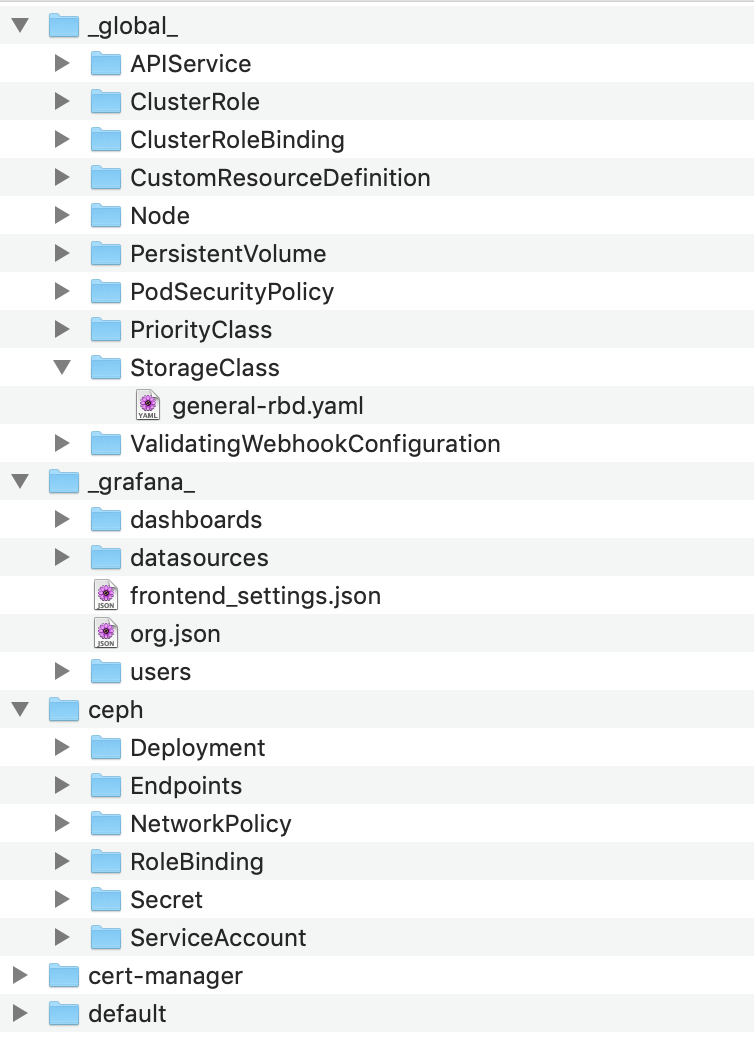https://github.com/Paxa/kube-backup
Kubernetes resource yamls backup to git
https://github.com/Paxa/kube-backup
backup-script devops kubernetes kubernetes-monitoring ruby
Last synced: 10 months ago
JSON representation
Kubernetes resource yamls backup to git
- Host: GitHub
- URL: https://github.com/Paxa/kube-backup
- Owner: Paxa
- Created: 2018-07-16T08:48:32.000Z (over 7 years ago)
- Default Branch: master
- Last Pushed: 2023-01-27T10:12:21.000Z (about 3 years ago)
- Last Synced: 2024-03-16T23:43:28.852Z (almost 2 years ago)
- Topics: backup-script, devops, kubernetes, kubernetes-monitoring, ruby
- Language: Ruby
- Homepage:
- Size: 50.8 KB
- Stars: 85
- Watchers: 4
- Forks: 14
- Open Issues: 5
-
Metadata Files:
- Readme: README.md
Awesome Lists containing this project
README
# Kube-backup
Kubernetes resource state backup to git
### Git structure
```
_global_ - global resources such as Node, ClusterRole, StorageClass
_grafana_ - grafana configs (when grafana enabled)
- such as kube-system, default, etc...
- folder for each resource type
- file for each resource
```
### Screenshots


### Deployment
Yaml manifests are in [deploy folder](https://github.com/kuberhost/kube-backup/tree/master/deploy).
#### Create Deployment Key
Github and gitlab support adding key only for one repository
* Create repo
* Generate ssh key `ssh-keygen -f ./new_key`
* Add new ssh key to repo with write access
* Save key to [2_config_map.yaml](https://github.com/kuberhost/kube-backup/blob/master/deploy/2_config_map.yaml) (see comments in file)
#### Testing Deployment
I recommend to run it periodically with kubernetes' CronJob resource, if you want to test how it works without waiting then can change running schedule or create pod with same parameters
### Commands
* `kube_backup backup` - pull remote git repository, save kubernetes state, make git commit in local repository
* `kube_backup push` - push changes to remote repository
* `kube_backup help` - shows help
Docker image by default runs `kube_backup backup && kube_backup push`
### Config
* `GIT_REPO_URL` - remote git URL like `git@github.com:kuberhost/kube-backup.git` (required)
* `BACKUP_VERBOSE` use 1 to enable verbose logging
* `TARGET_PATH` - local git repository folder, default `./kube_state`
* `SKIP_NAMESPACES` - namespaces to exclude, separated by coma (,)
* `ONLY_NAMESPACES` - whitelist namespaces
* `GLOBAL_RESOURCES` - override global resources list, default is `node, apiservice, clusterrole, clusterrolebinding, podsecuritypolicy, storageclass, persistentvolume, customresourcedefinition, mutatingwebhookconfiguration, validatingwebhookconfiguration, priorityclass`
* `EXTRA_GLOBAL_RESOURCES` - use it to add resources to `GLOBAL_RESOURCES` list
* `SKIP_GLOBAL_RESOURCES` - blacklist global resources
* `RESOURCES` - default list of namespaces resources, see `KubeBackup::TYPES`
* `EXTRA_RESOURCES` - use it to add resources to `RESOURCES` list
* `SKIP_RESOURCES` - exclude resources
* `SKIP_OBJECTS` - use it to skip individual objects, such as `kube-backup/ConfigMap/kube-backup-ssh-config` (separated by coma, spaces around coma ignored)
* `GIT_USER` - default is `kube-backup`
* `GIT_EMAIL` - default is `kube-backup@$(HOSTNAME)`
* `GIT_BRANCH` - Git branch, default is `master`
* `GIT_PREFIX` - Path to the subdirectory in your repository
* `GRAFANA_URL` - grafana api URL, e.g. `https://grafana.my-cluster.com`
* `GRAFANA_TOKEN` - grafana API token, create at https://your-grafana/org/apikeys
* `TZ` - timezone of commit times. e.g. `:Europe/Berlin`
### Security
To avoid man in a middle attack it's recommended to provide `known_hosts` file. Default `known_hosts` contain keys for github.com, gitlab.com and bitbucket.org
#### Custom Resources
Let's say we have a cluster with prometheus and certmanager, they register custom resources and we want to add them in backup.
Get list of custom resource definitions:
```
$ kubectl get crd
NAME CREATED AT
alertmanagers.monitoring.coreos.com 2018-06-27T10:33:00Z
certificates.certmanager.k8s.io 2018-06-27T09:39:43Z
clusterissuers.certmanager.k8s.io 2018-06-27T09:39:43Z
issuers.certmanager.k8s.io 2018-06-27T09:39:44Z
prometheuses.monitoring.coreos.com 2018-06-27T10:33:00Z
prometheusrules.monitoring.coreos.com 2018-06-27T10:33:00Z
servicemonitors.monitoring.coreos.com 2018-06-27T10:33:00Z
```
Or get more useful output:
```
$ kubectl get crd -o json | jq -r '.items | (.[] | [.spec.names.singular, .spec.group, .spec.scope]) | @tsv'
alertmanager monitoring.coreos.com Namespaced
certificate certmanager.k8s.io Namespaced
clusterissuer certmanager.k8s.io Cluster
issuer certmanager.k8s.io Namespaced
prometheus monitoring.coreos.com Namespaced
prometheusrule monitoring.coreos.com Namespaced
servicemonitor monitoring.coreos.com Namespaced
```
Set env variables in container spec:
```yaml
env:
- name: EXTRA_GLOBAL_RESOURCES
value: clusterissuer
- name: EXTRA_RESOURCES
value: alertmanager, prometheus, prometheusrule, servicemonitor, certificate, issuer
```
---
Special thanks to Pieter Lange for [original idea](https://github.com/pieterlange/kube-backup/)